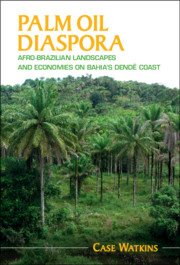Book contents
- Palm Oil Diaspora
- Afro-Latin America
- Palm Oil Diaspora
- Copyright page
- Contents
- Figures
- Tables
- Preface and Acknowledgments
- 1 Assembling an Afro-Brazilian Economy
- 2 African and Atlantic Worlds
- 3 Creolization
- 4 An Afro-Brazilian Landscape
- 5 South Atlantic Exchange
- 6 Landscapes, Religions, Transitions
- 7 Complexity
- Epilogue
- Bibliography
- Index
6 - Landscapes, Religions, Transitions
Published online by Cambridge University Press: 20 May 2021
- Palm Oil Diaspora
- Afro-Latin America
- Palm Oil Diaspora
- Copyright page
- Contents
- Figures
- Tables
- Preface and Acknowledgments
- 1 Assembling an Afro-Brazilian Economy
- 2 African and Atlantic Worlds
- 3 Creolization
- 4 An Afro-Brazilian Landscape
- 5 South Atlantic Exchange
- 6 Landscapes, Religions, Transitions
- 7 Complexity
- Epilogue
- Bibliography
- Index
Summary
This chapter examines probate inventories and other primary documents to chart the integration of Bahia’s dendê economy within the post-abolition transitions of the late nineteenth and early twentieth centuries. It reconstructs four socioecological processes fundamental in that synthesis: the expansion of dendê cultures and landscapes in and around nineteenth-century Salvador; the interactive emergence of transatlantic economies, landscapes, and religions on the bay island of Itaparica; the persistent proliferation of dendê landscapes despite official disregard and illegibility; and the complementary intensification of dendê and cacao production on the post-abolition Southern Coast. This chapter demonstrates how networks of people, plants, places, and power interacted across time and space to assemble and reproduce a transatlantic dendê economy combining nourishment, ecology, and spirituality.
Keywords
- Type
- Chapter
- Information
- Palm Oil DiasporaAfro-Brazilian Landscapes and Economies on Bahia's Dendê Coast, pp. 182 - 217Publisher: Cambridge University PressPrint publication year: 2021

